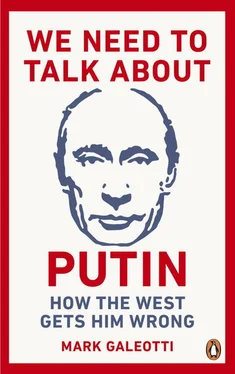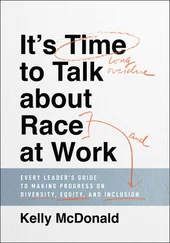By contrast, Putin appears both politically and psychologically dependent on his spooks, even though he never acquired the kind of insider knowledge required to understand how they work (and when they don’t). Russia has a number of intelligence and security services, four of which are the most significant. The FSB, a domestic counter-intelligence agency that seems more devoted to crushing political opposition than anything else, is the closest successor to the old KGB. Although corruption is something of a constant in Russian officialdom, the FSB is especially infamous for it, thanks to its virtual freedom from the law. Putin ran the FSB in 1998–9 and still treats it with the greatest indulgence. The SVR, the Foreign Intelligence Service, is essentially the KGB’s First Chief Directorate – it has a different acronym but the same role and even the same headquarters at Yasenevo in southern Moscow. The SVR specialises in human intelligence, planting deep-cover moles abroad and recruiting foreign agents. The GRU, or Main Intelligence Directorate, is military intelligence – technically it has simply been the GU, or Main Directorate, since 2010, but everyone in Moscow still calls it the ‘Gru’ and Putin has suggested restoring the old name. They are a much more gung-ho agency, doing everything from running spies and hacking computers to controlling Russia’s Spetsnaz , or special forces. Finally, there is the Federal Protection Service, the FSO, which is Putin’s Praetorian Guard and includes not just the sunglasses-and-dark-suit-wearing ‘bullet-catchers’ of the presidential security detail, but also the goose-stepping riflemen of the Kremlin Guard.
As with every aspect of the adhocracy, whatever their official roles, in practice the activities of these agencies overlap. The political policemen of the FSB also run missions abroad; the SVR sets up commando teams; the GRU does political intelligence; and the FSO snoops on them all. The result, at least in theory, is that they have an incentive to be aggressive and imaginative, as they compete for Putin’s favour. It should also help him control them by playing them off against each other, and double-check the information from one with that from the others.
Of course, it often doesn’t work like that. Like so many authoritarian leaders, Putin has over time become less and less willing to listen to alternative perspectives. As one former Russian spy told me, the intelligence agencies have learned that ‘you do not bring bad news to the tsar’s table’. As with everything under Putin, politics around intelligence is competitive to the point of cannibalism. In 2003, the Federal Agency of Government Communications and Information (FAPSI), Russia’s electronic snooping agency comparable to Britain’s GCHQ or the US NSA, was eaten up by its rivals, divvied up between the FSB, FSO and GRU. So they all compete to tell Putin what they think he wants to hear, to flatter his prejudices and to reassure him that everything is going well. Officials I have spoken to at the Russian foreign ministry, for example, gloomily admit that Putin turns to FSB assessments of what’s happening abroad before their own – this would be like the British prime minister asking MI5 about the latest news from Germany.
Putin typically starts his workday in the early afternoon (he is late to bed and late to rise) with a trio of leather-bound briefing files: the FSB’s report on domestic affairs, the SVR’s on developments around the world and the FSO’s on what is going on within the Russian elite. In other words, his first and main introduction to each day comes from his spooks. Furthermore, there is a vicious cycle of escalating claims and conspiracy theories, as the various services compete for the boss’s attention with ever-more-lurid allegations. When Putin claims that the West is trying to undermine him, that Ukraine is run by neo-Nazis or that a secret ‘deep state’ conspiracy dominates Washington, is he just posturing, or is he in fact repeating eye-catching nonsense from intelligence briefings that aim to enthral rather than educate him?
Putin is still a spook fanboy, without much fieldwork under his belt and with limited managerial experience in the services. But he likes, trusts and listens to them. At the same time, without meaning to, he is King Lear to his ambitious daughters, apportioning his kingdom based on how well they flatter him. So, of course, they do. While Putin certainly controls Russia’s intelligence agencies, how far do they control or at least influence him in return, through the picture of the world they paint?
Chapter 3: Putin’s Not Looking to Revive the USSR, or Tsarism for That Matter
Back in 2007, I was having a drink with a retired Russian spy, a colonel in the KGB who had chosen to leave the service in 1991. After a few years in what he always vaguely described as ‘corporate intelligence’ – obviously lucrative, as I doubt his government pension would have allowed him to buy that new BMW 7 Series every few years – he retired to read books about the Second World War, dote on his grandchildren, and periodically predict the war to end all wars. Putin had recently given a speech in Munich that had the colonel glowing with apocalyptic glee.
That speech was, in many ways, the start of a new and rather more dangerous chapter in global politics. When Putin had first come to power in 2000, he spoke the language of tough nationalism but was in practice strikingly pragmatic. He was no fan of Western democracy, but he did believe that Russia’s best future depended on developing some kind of positive working relationship with the West. The 9/11 terrorist attacks on the USA gave him a perfect opportunity to build rapport on an issue where there was genuine common interest: he was the first world leader to contact President George W. Bush to express sympathy after the attacks, and followed up with practical support and assistance that ranged from intelligence sharing to allowing Coalition forces deploying to Afghanistan to be supplied through Russia.
Putin’s notions of cooperation proved out of step with the West’s. He expected them to be similarly understanding of his brutal war against Chechen separatists, which he framed as a counter-terrorism operation, and was infuriated when he faced criticism for human rights violations (as his forces pounded cities and interned civilians). When seven Central European nations, including the three Baltic states that had once been part of the USSR, were allowed to join NATO in 2004, Putin regarded this as a direct breach of prior understandings (which NATO denied) and an eastward expansion of an anti-Russian military alliance. The irritants and misunderstandings accumulated, and they burst forth in his speech in Munich. He criticised the USA for trying to create a ‘unipolar’ world under its domination, accusing it of ‘an almost uncontained hyper use of force… that is plunging the world into an abyss of permanent conflicts’.
This was strong stuff, a genuine cry of anger, frustration and embittered disillusion, which, of course, was music to the ears of my friend, the KGB colonel. ‘Mark my words,’ he chortled, pouring himself another glass of Armenian cognac, ‘within three years there will be war. There will be war.’ Why – because Putin wants to expand Russia’s borders? ‘Oh no,’ he replied, taken aback by my Western paranoia. ‘Because you will have invaded us.’ It is all too easy for us to focus on the undoubted aggression of Putin’s Russia without considering the deep insecurities in which it is rooted.
It’s not as though Putin helps the situation. If you’re the undisputed master of a nation, you should be wary of making offhand statements, especially ones that seem to justify others’ worst fears about you. In a speech in the Kremlin in 2005, Putin said that ‘the collapse of the Soviet Union was the major geopolitical catastrophe of the century’. Never mind that he was focusing on the plight of ethnic Russians who had suddenly found themselves outside their nation’s borders, and on the way that ‘the epidemic of disintegration infected Russia itself’. Never mind that in the same year he said that ‘those who do not regret the collapse of the Soviet Union have no heart, and those who do regret it have no brain’. None of that context matters, and the original line about the ‘geopolitical catastrophe’ has since been endlessly cited as evidence that he hankers after those halcyon Soviet days and wants to restore the USSR.
Читать дальше












